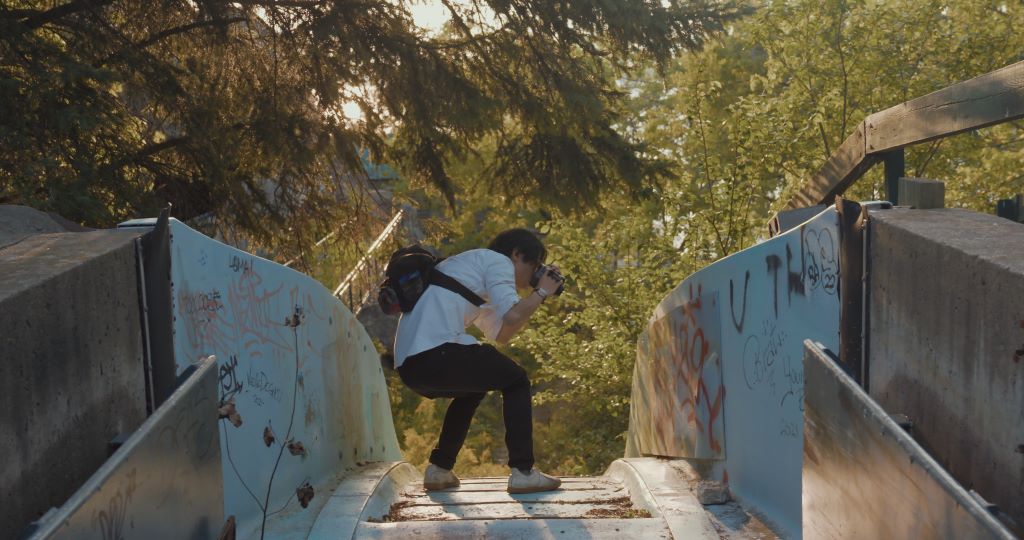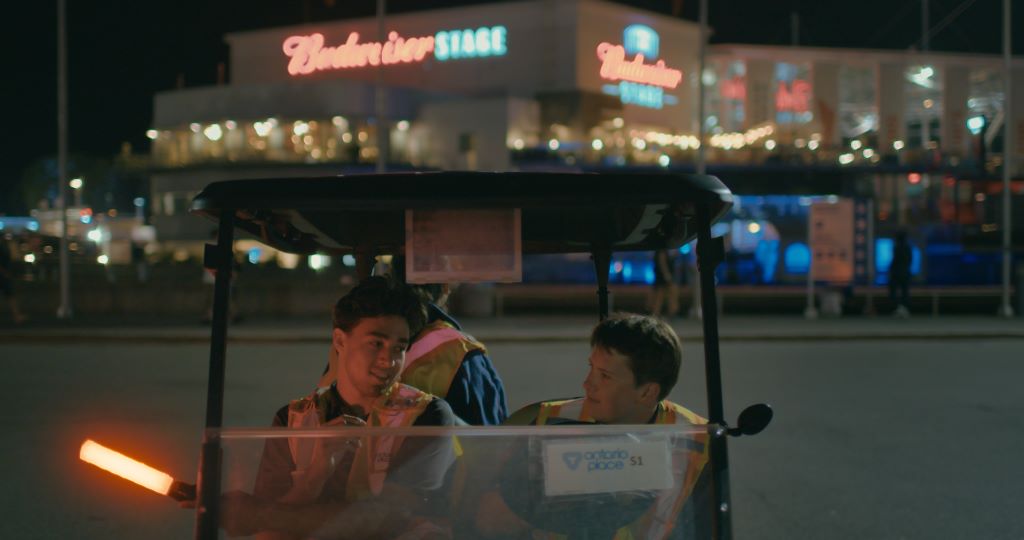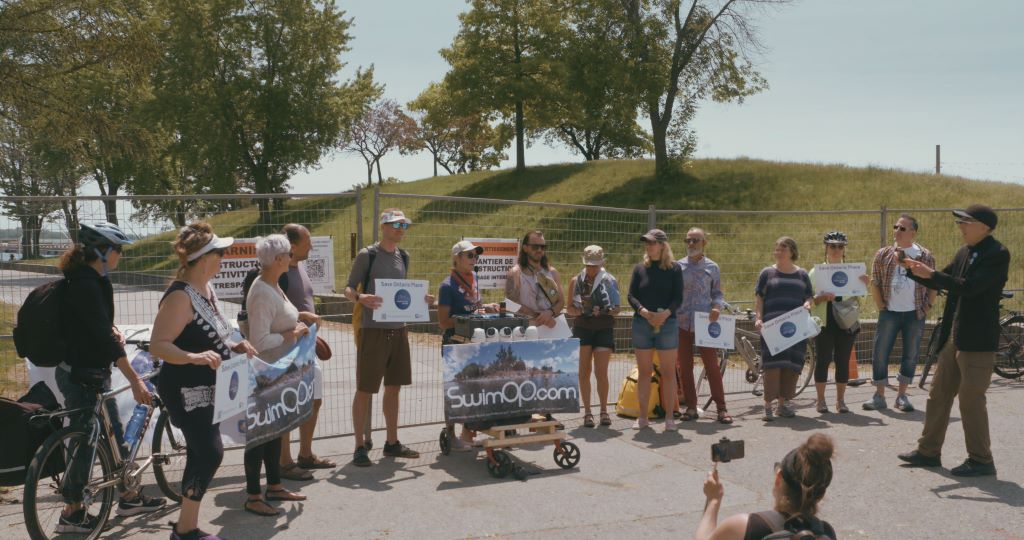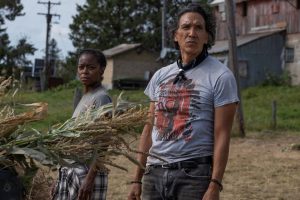Reviews include Superman, Apocalypse in the Tropics, and To a Land Unknown.
Yours to Re-discover: Ali Weinstein on the Magic of Ontario Place
February 17, 2025

By Chris Knight
There’s a scene in Your Tomorrow, a film about the redevelopment of Ontario Place, where someone points out that if you mention the former tourist destination to a Torontonian, their response will be: “I remember when…”
Ali Weinstein, the film’s director, is no stranger to that feeling.
“I grew up in Toronto, so I definitely had a lot of memories being there as a kid,” she recalls. “I went with my parents. I remember the log ride being really magical and exhilarating. I have memories of going with my grandparents and going to the water park.”
Weinstein’s tribute to this memorable space is now one of three nominees for the TFCA’s Rogers Best Canadian Documentary award, which carries a cash prize of $50,000. (The other nominees are Any Other Way: The Jackie Shane Story and Yintah.)
She adds that this was in the park’s latter days, leading up to its closure in 2012. The Wilderness Adventure Ride, as the log ride was called, was added in 1986; the water park came a few years after that.
“Whereas my parents, you know, they remember the original Ontario Place. And in fact, my dad was an usher at the Cinesphere in the ’70s when he was a teenager in high school.”
Her father, Larry Weinstein, a filmmaker as well, would have been one of some 700 summer students hired by the attraction in its heyday.
Ontario Place opened in 1971, part of a Canadian educational-cultural renaissance that gave us Montreal’s Expo 67, the Ontario Science Centre in 1969 and Toronto’s world-class zoo (and monorail!) in 1974.
It featured the world’s first permanent IMAX screen (the Cinesphere), which showed a short travelogue, North of Superior, on a loop for visitors. There was a glorious outdoor bandstand (the Forum) and exhibition space in futuristic pods that recently stood in for an alien planet in an episode of Star Trek: Strange New Worlds.
There were lagoons and green space, and a massive playground (Children’s Village), remembered in The Guardian newspaper a few years ago as both “the world’s greatest playground” and, thanks to its punching-bag forest, “the most reliable producer of bloody noses in Toronto.” (This writer can attest to both those descriptions.)
But over time, Ontario Place lost its shine, and then its way. The Forum was razed to make way for the bigger (more profitable) Molson Amphitheatre. Children’s Village fell and was replaced with (more profitable) midway rides. The Cinesphere closed along with the park in 2012, reopened in 2017, closed again in 2022 and has remained shuttered since.
Weinstein’s Your Tomorrow reveals some of this history and drama, but her real focus was to capture the final days of the parkland before it was closed to the public for redevelopment into a giant spa and waterpark.

“I felt really sad about what we were going to lose,” she says, “and I wanted to document how special this place was in this sort of limbo moment, like after its heyday, before it gets redeveloped.”
She continues: “I toyed a little bit with how to do that, how to document it properly. And to me, the most obvious thing was to follow the quote-unquote ‘fight’ to save Ontario Place. But then I realized, after pondering that approach and talking to some colleagues and friends, that that is a pretty typical way to approach these types of redevelopment stories.”
Nothing wrong with doing the typical thing, of course. “But really, my real fascination with the place was about the magic that you can experience from a physical place.”
Weinstein uses the term “magic” often to describe the sublime charm and appeal of Ontario Place. And it is (or rather was) a magical place, thanks to the visions of its chief designers, architect Eberhard Zeidler (1926 – 2022) and landscape architect Michael Hough (1928 – 2013). And lest we forget Eric McMillan (1942 – ), “the father of soft play,” who designed the Children’s Village and an adjacent water play area.
“There was so much idealism and so much vision for this futuristic place, to unite the urban and the natural world and give people a place to connect with water,” says Weinstein. “And there was so much cool abstract thinking and big picture idealism. And I felt like 50 years later … I could feel that still. I could feel this calmness and this connection to nature, and this adventure too. Because there’s so many nooks and crannies to explore that are very different from one another in this relatively small area.

“And so I thought, if I’m trying to tell a story about this ineffable feeling that one has when you’re in a physical place that’s been designed for you, it’s maybe not going to cut it to have a bunch of talking heads say: ‘Oh, I just feel great when I’m there.’ Because that’s a little boring.”
Besides, Weinstein had already forged a more personal relationship with Ontario Place. In addition to her childhood memories of the park as a thriving tourist destination, she (like many Torontonians) had rediscovered its uncrowded, socially distant spaces during the pandemic.
“In 2020, I just found myself going to Ontario Place a lot for the first time in many, many years, since we were all trying to be outside more. I stumbled on it again and realized that it was actually this incredible de facto public park at this point in time, where there was no real active programming anymore, except for in Trillium Park — that had already been redeveloped a little bit into a beautiful natural public space.”
Trillium Park, the easternmost section of Ontario Place, had indeed been re-landscaped and kitted out with public art and pathways back in 2017.
“But in the West Island and the central area of Ontario Place, it was just like all the beautiful futuristic architecture was there. All the remnants of the rides were there. And it was just re-wilded, and had these beautiful mature trees and gorgeous nature,” recalls Weinstein.
“And people were using the space! And I noticed that I would see a lot of the same people over and over again. So I became a regular there, and I saw that there were other regulars there, and I guess I just became really interested in what’s going to happen next.”
She adds: “I decided to take this more observational approach, and just watch how people use the space.”

People are the heart and soul of Your Tomorrow: a ragtag collection of artists, birders, musicians, philosophers, nature enthusiasts, tomato growers, dog walkers, and the occasional explorer. The area in and around the Wilderness Adventure Ride was for some reason not fenced off, and visitors could wander through the twisted metal and Plexiglas ruins of the attraction.
“It felt like you were doing all this crazy urban exploring, but you really didn’t have to break in at all,” she recalls. (This writer can attest to that as well.)
Weinstein also dug up some incredible archival footage of Ontario Place in the ’70s. Your Tomorrow will occasionally cut jarringly, wonderfully, from polyester-clad crowds flocking around the futuristic pods and lagoons to those same spaces today, now empty and sometimes overgrown with weeds. It’s as if we’re watching post-apocalyptic science-fiction, with the twist that the “post” is now.
And to think she almost didn’t get that footage in time. “We were really excited when we were first putting together our plan for the film, because my producer [Geoff Morrison] and I saw that the Archives of Ontario had this huge database of films of Ontario Place, the vast majority of which had never been digitized. So it’s not like we could watch it online, but there were descriptions and it sounded incredible, and they give it to you virtually for free, even as a commercial film. So we were overjoyed.”
However, when time came to actually get the footage, Weinstein again encountered the perils of an underfunded service. “We were making requests to view footage, and it would take literally half a year to be able to watch this stuff,” says Weinstein
She continues: “Some of the footage that’s in the film came in the nick of time. Like, the week that we were supposed to be locking the film. Suddenly, stuff that we had requested many months ago became available. And I have to give a lot of credit to my producer, who tracked down the right person at the archives, and also the archives really came through for us in the final hour.”

One such last-minute clip features then-premier Bill Davis at the official opening of Ontario Place. It’s worth quoting in its entirety: “The view of the harbour, the city of Toronto, the lagoons and pavilions, which provide all of us with an inspiring spectacle, is much more than just a new vantage point. It is a stimulating and permanent symbol of the work and achievement of the people of Ontario. The vision and scope of Ontario Place, ladies and gentlemen, gives promise of our vast potential.”
“It was so sad to hear that quote,” Weinstein says, “as we were wrapping up the film, and at that point Ontario Place had already been shut down to the public. They hadn’t yet torn down trees or anything like that. But we knew we wanted to put that in the film.”
Weinstein’s first feature was the 2017 documentary Mermaids, which followed a variety of people who are living the mermaid lifestyle, in settings as diverse as Sacramento’s mermaid-themed Dive Bar and Florida’s Weeki Wachee Springs State Park, where mer-formers sometimes undertake 35-metre deep dives.
She also has a producing credit on Lulu Wei’s 2020 doc There’s No Place Like This Place, Anyplace, about the last days of another Toronto landmark, Honest Ed’s discount store. Does she have an affinity for, to put it bluntly, lost causes?
“I guess I have a type when I’m choosing characters,” she says carefully. “I’ve been trying to think about if there’s any connection between the films I’ve chosen to direct. I feel like I was drawn to people doing weird things, people who were finding a passion or a community in a subculture.” (She also made #Blessed, a 2020 doc about an Evangelical church in Toronto aimed at the young, cool and tattooed.)
“And in a way, I don’t think that this Ontario Place film ended up being that different, even though my way in was more about design and physical space and less about: ‘Oh, here’s a group of quirky people doing something strange.’”
She continues: “I did end up finding some of those people who were a bit eccentric, and who came together. And I think that was a big part of my fascination with the space. And I do have an overarching interest in living in a city in this day and age, and how lonely that can be. There’s so little opportunity to find community, and to find our people, and to find our sense of meaning and purpose.
“And so I think that’s a bit of a through-line, just these people who are finding like-minded people in odd spaces.”

It seems an obvious question, but just for the record, how does Weinstein feel about the future of Ontario Place as a home for a giant spa and waterpark?
“I personally think that the spa’s a really bad idea for this piece of land,” she says. “It’s such valuable, beautiful outdoor property on the water. And the plan, as it stands right now, is to encase that whole massive piece of land of the West Island inside and make it an indoor space. You don’t need that particular land to do that; you could do that anywhere.”
“So I think it’s really wasting this gorgeous natural area that we have. And I think there could have been so many other superior uses of this space. I think it could have been a great tourist attraction, actually, if it was just treated like a beautiful, cared-for public park that was like this gem in Toronto.”
She continues: “So yeah, I don’t think that people are going to have very many magical, transformative experiences in the spa. They might have, like, a nice day at the spa, which you can do at many other spas.
“But who knows what will happen in the future? Plans can be derailed. Perhaps there’s a world in which we can find really incredible landscape architects to redesign something beautiful that’s going to be different from what we had, but still within the original spirit of nature and pride in Ontario.
“I want to be hopeful about that.”
Your Tomorrow is playing in select theatres.
The winner of the Rogers Best Canadian Documentary award will be announced on Feb. 24.



